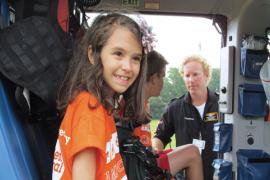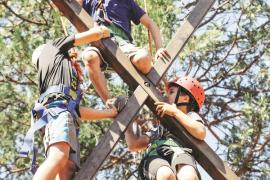| Social Justice This article is part of Camping Magazine's series on social justice, exploring social issues in the context of individual camps and the camp community as a whole as a way to spark further conversation and inspire positive change. Contact Ann Gillard ([email protected]) if you would like to participate or contribute to this series. |
Eden Village Camp, the Jewish farm-to-table sleepaway camp in Putnam Valley, New York, has an unusual business plan: to "be the camp we wish to see," borrowing from Ghandi's quote encouraging us to "be the change you wish to see." Social justice and environmental responsibility are guiding lights of Eden Village's community, and this is evident at all levels of the camp's operations, from their organic and local food to the world-fixing themes of many activities.
The business plan seems to be working, as like-minded families from around the country seek out Eden Village. In the seven years since its launch, Eden Village has grown steadily to 425 campers ages seven to 17 each summer, and plans to expand to increase capacity. As part of its commitment to a diverse camper body, it gives over $250,000 yearly in scholarships and has launched a small inclusivity program for campers with special needs.
"Rather than being a retreat from the world," says Founding Director Yoni Stadlin, "we aim to help our campers step more powerfully into the world. The refrain of a camp song, and the theme of a recent summer, is 'We are the ones we've been waiting for.'"
How does Eden Village nurture young activists? "To feel inspired to champion a cause," Stadlin says, "you have to love what you're protecting. So our first mission is to foster true connection — with nature, with people from all different backgrounds, with our own inner selves."
To create the safe space needed for kids and teens to let down their guards and connect in these ways, Eden Village systematically builds what it calls a "culture of kindness." While Eden Village offers leadership training for older campers, "simple kindness and empathy are the bedrock of social justice," Stadlin says. "They're also our most natural way of being." He thinks of Eden Village's social justice education as having two parts: the explicit justice-oriented curriculum, where campers work toward a healthier, more sustainable society; and perhaps more importantly, the lived experience of simply being part of a wholesome, conscious community.
Following is an examination of key building blocks of Eden Village's culture of kindness, including staff training practices, an in-depth look at the "no body talk" guideline, Jewish values, seeing environmentalism as a human rights issue, and embedded details that add up to kindness being, as Stadlin puts it, "the air we breathe."
Everything Is Curriculum
Building culture begins in a rigorous staff selection process to ensure a values match. "Our staff know that everything is curriculum," says Stadlin. "Our campers are learning from everything they do." The ten-day, pre-camp staff training and ongoing training during camp go well beyond the basics. In sessions devoted to "Liberation" and "Cycles of Oppression," staff raise awareness of privilege and explore how various forms of oppression function, how to be a strong ally and ensure each community member feels seen, and how to create a community that liberates. Sessions on "Nonviolent Communication" teach a way of thinking that increases the likelihood that staff will be able to connect with the person with whom they're talking — especially when it's hard to do so. "Behavior Guidance" training offers a coaching technique for inspiring kids of varied learning styles to act in positive ways because they want to, rather than because someone made them. Staff practice keeping sarcasm to a minimum, and saying "yes" to goofy fun instead of upholding a "cool" image. In small groups that include staff from all departments, staff hold "Listening Circles" where everyone has time to share whatever is on their heart.
The "No Body Talk" Guideline
A pillar of the culture of kindness is the "no body talk" guideline, which increasing numbers of camps and schools are adopting. It reads, "While at camp, we take a break from commenting on our own or others' appearance or clothes, be it negative, neutral, or positive" (Eden Village Camp, 2016). Exceptions exist for health and safety issues and educational content, and campers do have important conversations about body image, social pressures, puberty, and more.
Spiritual Underpinnings of a Culture of Kindness
Judaism plays an important role in emphasizing kindness and pursuit of justice, and contextualizing it as a deep-seated aspect of the campers' heritage. Stadlin reflects that "It's powerful to have this ancient wisdom tradition as a shared language. But our ends are universal."
Each morning, campers choose from among "morning practice" options for starting the day with gratitude and intention. Campers sing gratitude songs before and after meals, and Shabbat is a weekly highlight — a whole day for celebrating the world and each other just as things are, without fixing or acquiring anything. Often in humorous ways, kid-friendly prayer services emphasize core values about the unity and sacredness of all beings.
Farm-to-table programs build skills while transmitting Jewish values, such as har vesting food to donate. In the "Mitzvah Relay," campers race around camp doing good deeds. Sitting in circles under trees, campers discuss Jewish stories that warn against gossip and affirm the power of their words, or tell of an elderly person who planted fruit trees that would never fruit in that individual's own lifetime.
Environmentalism Is Social Justice Work
Many people think of environmentalism as being about saving the whales or rainforest. Stadlin points out, though, that given the human toll already assessed worldwide by climate change and environmental degradation, especially among vulnerable low-income populations, environmentalism has become a human issue. To take seriously the mandate to "love your neighbor as yourself," he says, means working to protect the environment.
Eden Village campers see this connection, so when they tend the bees, they know they are not only supporting the ailing bee population, but protecting key pollinators we all need for a robust food supply. They know when they observe Shabbat as a day to rest from buying things and instead appreciate the abundance they already have, they're participating in a radical antidote to consumerism, and so on.
Kindness in the Air We Breathe
The magic might live in the countless details. The rules against electronics and "canned music" — live music only — help keep pop culture at bay and allow Eden Village to create a world apart. Packing lists encourage simple clothing free of big brand logos. Camp songs have positive messages, and cabins are named after Jewish activists such as Heschel, who marched with Martin Luther King Jr., and Zlofhad, who championed women's rights. Many LGBTQ-identified staff and campers return each year. The flag flying over the lake is an earth flag. The camp's gourmet menu is almost entirely vegetarian, as that's one of the most impactful ways to reduce a carbon footprint.
Manual labor is never used as punishment, but rather honored as a valuable part of camp life. As campers garden, compost, and care for farm animals, they develop meaningful relationships with plants and animals. The art room's "Reuse-o-Rama" materials become art. Instead of a color war, there's an actionpacked Mitzvah Day where campers dedicate their athletic, artistic, and other efforts to supporting their nonprofit of choice. A group of elated junior staff recently reported back to all of camp about their meeting with a state senator to advocate against fracking (a process of deep drilling through rock to access natural gas). There is a concerted effort to honor introverts as well as extroverts. At the open mic called "Share," all presenters receive roaring applause, whether they learned to play guitar that morning or have been performing for years.
Bringing It Home
As closing day draws near, campers' thoughts inevitably turn toward returning home, which sometimes comes with some anxiety. Eden Village facilitates peer conversations and also guides the transition with activities about "Bringing It Home." Campers publicly make a Brit Adamah (covenant with the earth), a Specific , Measurable, Achievable, Relevant, and Time-limited (SMART) commitment to an action they'll undertake at home. In a closing ceremony, campers receive painted wood necklaces that name some of their most profound, unique gifts that will serve them for a lifetime. Eden Village encourages parents to meet their campers anew after camp, to give them space to be new and changed. Campers report that keeping in touch with camp friends has been a key support, and Eden Village hosts a reunion and regional meet-up.
In one session's final closing, Stadlin told the campers, "We don't do pottery just so you can make a cool cup — I want you to know you are a creator. We don't collect eggs in the morning just to get food — I want you to know you are a nurturer and provider.
"This camp is my dream and my work to make the world a better place," he adds. "What's your dream? What will it take to make it a reality?"
As the campers step back out into the world, it's a powerful question to hold.
No Body Talk Guideline — Eden Village Camp
Reference
Eden Village Camp. (2016). Body talk FAQ. Retrieved from http://edenvillagecamp.org/about-us/bodytalk
Vivian Lehrer is a writer, mom, and Eden Village board member.
Photo courtesy of Eden Village Camp, Putnam Valley, New York.



